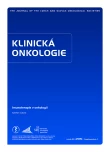Present Experience and Perspectives of Immunotherapy of Lung Cancer
Authors:
L. Havel
Authors‘ workplace:
Pneumologická klinika 1. LF UK a Thomayerova nemocnice, Praha
Published in:
Klin Onkol 2015; 28(Supplementum 4): 73-76
Category:
Specials
doi:
https://doi.org/10.14735/amko20154S73
Overview
Lung cancer is the most common cancer in the world. Lung cancer is also the most common cause of death caused by cancer worldwide with fatality rate (the overall ratio of mortality to incidence) of 0.87. Nowadays, cure can be achieved only in early disease stages using surgical resection or radical radiotherapy. This approach can be considered only in 20% of patients. Outcome of therapy of loco-regionally advanced or metastatic lung cancer are unsatisfactory. Despite improvement of radiotherapy techniques, despite introduction of new cytostatics and new targeted therapies, long-term disease control could be achieved only in minority of patients. Immunotherapy is a therapeutic approach which uses the immune system itself against cancer. This article is a summary of the authors’ 17-year experience with different immunotherapeutic agents. It will be focused on big anti-cancer vaccines trials START and MAGRIT, and especially trials in the upcoming era of ‘checkpoint inhibitors’. Future perspectives of immunotherapy and its combination of recent therapeutic approaches will be considered.
Key words:
lung cancer – immunotherapy – vaccines – immune checkpoint inhibitors – programmed cell death protein 1
The author declares he has no potential conflicts of interest concerning drugs, products, or services used in the study.
The Editorial Board declares that the manuscript met the ICMJE recommendation for biomedical papers.
Submitted:
27. 7. 2015
Accepted:
27. 10. 2015
Sources
1. Giaccone G, Debruyne C, Felip E et al. Phase III study of adjuvant vaccination with Bec2/ bacille Calmette ‑ Guerin in responding patients with limited ‑ disease small‑cell lung cancer (European Organisation for Research and Treatment of Cancer 08971 - 08971B; Silva Study). J Clin Oncol 2005; 23(28): 6854 – 6864.
2. Nokihara H, Katakami N, Hida T. Phase I/ II study of tecemotide cancer immunotherapy for Japanese patients with unresectable stage III non‑small cell lung cancer (NSCLC). J Clin Oncol 2015; 33 (Suppl): abstr. 3036.
3. Butts C, Socinski MA, Mitchell PL et al. Tecemotide (L ‑ BLP25) versus placebo after chemoradiotherapy for stage III non‑small‑cell lung cancer (START): a randomized, double‑blind, phase 3 trial. Lancet Oncol 2015; 15(1): 59 – 68. doi: 10.1016/ S1470 ‑ 2045(13)70510 ‑ 2.
4. Vansteenkiste J, Byoung ‑ Chul C, Vanakesa T et al. MAGRIT, a double‑blind, placebo controlled phase III study to assess the efficacy of the recMAGE ‑ A3 + AS15 cancer immunotherapeutic as adjuvant therapy in patiens with resected MAGE ‑ A3 - positive non‑small cell lung cancer. Ann Oncol 2014; 25 (Suppl 4): iv409.
5. Ramalingam S, Crawford J, Chang A et al. Talactoferrin alfa versus placebo in patients with refractory advanced non‑small‑cell lung cancer (FORTIS ‑ M trial). Ann Oncol 2013; 24(11): 2875 – 2880. doi:10.1093/ annonc/ mdt371.
6. Vesely MD. Natural innate and adaptive imunity to cancer. Annu Rev Immunol 2011; 29 : 235 – 271. doi: 10.1146/ annurev ‑ immunol ‑ 031210 ‑ 101324.
7. Finn OJ. Immuno ‑ oncology: understanding the function and dysfunction of the immune system in cancer. Ann Oncol 2012; 23 (Suppl 8): viii6 – viii9. doi: 10.1093/ annonc/ mds256.
8. Zatloukal P, Heo DS, Park K et al. Randomized phase IIclinical trial comparing tremelimumab (CP ‑ 675,206) with best supportive care (BSC) following first‑line platinum‑based therapy in patients with advanced non‑smallcell lung cancer (NSCLC). J Clin Oncol 2009; 27 (Suppl 15): abstr. 8071.
9. Brahmer J, Reckamp K, Baas P et al. Nivolumab versus docetaxel in advanced squamous ‑ cell non‑small‑cell lung cancer. N Engl J Med 2015; 373(2): 123 – 135. doi: 10.1056/ NEJMoa1504627.
10. Paz ‑ Ares L, Horn L, Borghaei H et al. Phase III, randomized trial (CheckMate 057) of nivolumab (NIVO) versus docetaxel (DOC) in advanced non‑squamous cell (non‑SQ) non‑small cell lung cancer (NSCLC). J Clin Oncol 2015; 33 (Suppl): abstr. LBA109.
Labels
Paediatric clinical oncology Surgery Clinical oncologyArticle was published in
Clinical Oncology

2015 Issue Supplementum 4
- Possibilities of Using Metamizole in the Treatment of Acute Primary Headaches
- Metamizole at a Glance and in Practice – Effective Non-Opioid Analgesic for All Ages
- Metamizole vs. Tramadol in Postoperative Analgesia
- Spasmolytic Effect of Metamizole
- Metamizole in perioperative treatment in children under 14 years – results of a questionnaire survey from practice
-
All articles in this issue
- Immunotherapy of Bronchogenic Carcinoma and Its Perspectives
- Immunoscore and Its Predictive Value for Colorectal Cancer
- Immune System in Patients with Head and Neck Carcinoma
- Immunotherapy of Urothelial Carcinoma of the Bladder – from BCG Vaccines to Targeted Therapy
- Side‑ effects of Modern Immunotherapy and How to Solve Them in the Clinics
- Therapeutic Effect and Tolerance of Ipilimumam in Metastatic Malignant Melanoma in Children – a Case Report
- History of Immunotherapy – from Coley Toxins to Checkpointsof the Immune Reaction
- Anti‑tumour Weapons of the Immune System
- The Role of Regulatory T-cells in Antitumor Immune Response
- Escape Strategies of Tumors from Immune Surveillence
- Role of Immunotherapy in Pediatric Oncology
- Chimeric Antigen Receptor T-cells – Gene Therapy of the Future for Malignant Diseases?
- The Concept of Immunogenic Cell Death in Antitumor Immunity
- Importance of the Immune System and Immunotherapeutic Options in Malignant Melanoma
- Immunotherapy for Renal Cell Carcinoma
- Role of the Immune System and Possibilities of Immunotherapy in Prostate Cancer
- Present Experience and Perspectives of Immunotherapy of Lung Cancer
- Clinical Oncology
- Journal archive
- Current issue
- About the journal
Most read in this issue
- Side‑ effects of Modern Immunotherapy and How to Solve Them in the Clinics
- Immunotherapy of Urothelial Carcinoma of the Bladder – from BCG Vaccines to Targeted Therapy
- Escape Strategies of Tumors from Immune Surveillence
- The Concept of Immunogenic Cell Death in Antitumor Immunity
